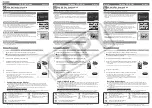
234
Copyright © Acronis, Inc., 2000-2010
Recovery exclusions
Set up exclusions for the specific files you do not wish to recover.
Use the
Add
,
Edit
,
Remove
and
Remove All
buttons to create the list of file masks. Files whose
names match any of the masks will be skipped during recovery.
You can use one or more wildcard characters * and ? in a file mask:
The asterisk (*) substitutes for zero or more characters in a file name; for example, the file mask
Doc*.txt yields files such as Doc.txt and Document.txt
The question mark (?) substitutes for exactly one character in a file name; for example, the file
mask Doc?.txt yields files such as Doc1.txt and Docs.txt — but not the files Doc.txt or Doc11.txt
Exclusion examples
Criterion
Example
Description
Windows and Linux
By name
F.log
F
Excludes all files named "F.log"
Excludes all folders named "F"
By mask (*)
*.log
F*
Excludes all files with the .log extension
Excludes all files and folders with names starting with "F"
(such as folders F, F1 and files F.log, F1.log)
By mask (?)
F???.log
Excludes all .log files with names consisting of four
symbols and starting with "F"
Windows
By file path
Finance\F.log
Excludes files named "F.log" from all folders with the
name "Finance"
By folder path
Finance\F\ or Finance\F
Excludes folders named "F" from all folders with the
name "Finance"
Linux
By file path
/home/user/Finance/F.log
Excludes the file named "F.log" located in the folder
/home/user/Finance
The above settings are not effective for the files or folders that were explicitly selected for recovery.
For example, assume that you selected the folder MyFolder and the file MyFile.tmp outside that
folder, and selected to skip all .tmp files. In this case, all .tmp files in the folder MyFolder will be
skipped during the recovery process, but the file MyFile.tmp will not be skipped.
Overwriting
Choose what to do if the program finds in the target folder a file with the same name as in the
archive:
Overwrite existing file
- this will give the file in the backup priority over the file on the hard disk.
Overwrite existing file if it is older
- this will give priority to the most recent file modification,
whether it be in the backup or on the disk.
















































